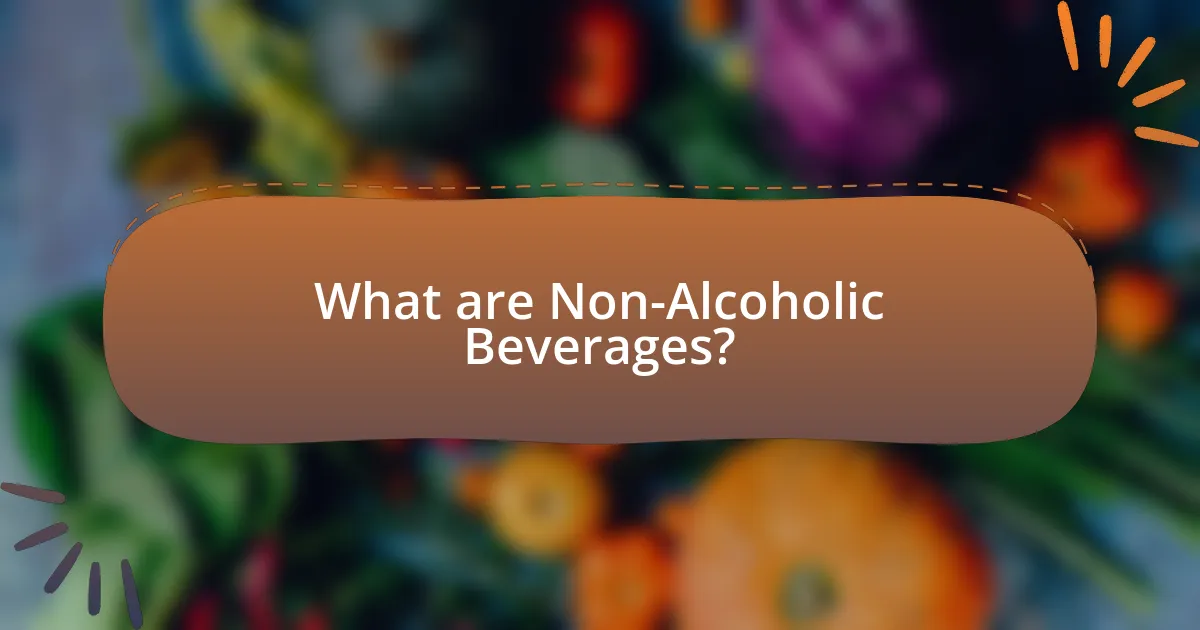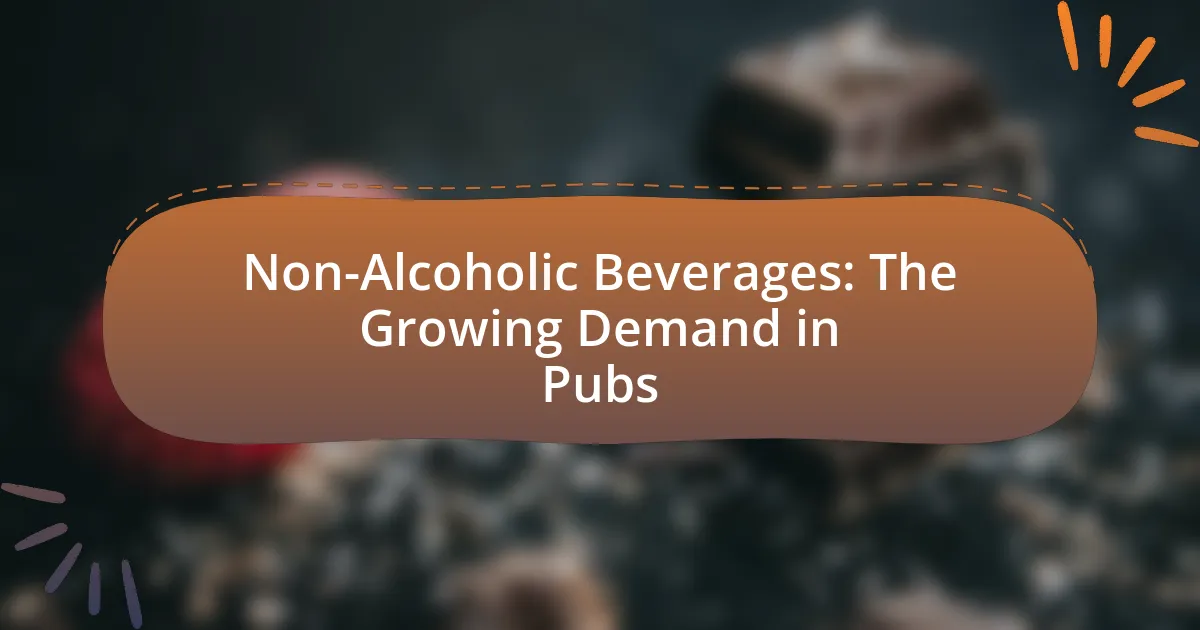Non-alcoholic beverages are drinks with an alcohol content of 0.5% or less, encompassing a variety of options such as soft drinks, juices, teas, and non-alcoholic beers and wines. The article explores the increasing demand for these beverages in pubs, driven by consumer preferences for healthier and inclusive drinking options. It discusses the differences between non-alcoholic and traditional alcoholic drinks, the types available in pubs, production and marketing strategies, and the social trends influencing their rise. Additionally, it addresses the challenges pubs face in incorporating non-alcoholic beverages and offers strategies for effective promotion and service, highlighting the significant role these drinks play in enhancing the pub experience for non-drinkers.

What are Non-Alcoholic Beverages?
Non-alcoholic beverages are drinks that contain little to no alcohol, typically defined as having an alcohol content of 0.5% or less. These beverages include a wide variety of options such as soft drinks, juices, flavored waters, teas, and non-alcoholic beers and wines. The growing demand for non-alcoholic beverages in pubs reflects a shift in consumer preferences towards healthier and more inclusive drinking options, with many establishments expanding their menus to cater to this trend.
How do Non-Alcoholic Beverages differ from traditional alcoholic drinks?
Non-alcoholic beverages differ from traditional alcoholic drinks primarily in their alcohol content, as non-alcoholic beverages contain little to no alcohol, typically defined as having less than 0.5% alcohol by volume (ABV). This distinction allows non-alcoholic beverages to cater to individuals who prefer to avoid alcohol for health, personal, or legal reasons, while still providing a variety of flavors and experiences similar to those found in alcoholic drinks. For instance, the global market for non-alcoholic beverages has been expanding, with a report from IWSR indicating a 31% increase in non-alcoholic beer consumption from 2016 to 2021, highlighting the growing demand and acceptance of these alternatives in social settings such as pubs.
What types of Non-Alcoholic Beverages are available in pubs?
Pubs offer a variety of non-alcoholic beverages, including soft drinks, juices, mocktails, and non-alcoholic beers. Soft drinks typically encompass cola, lemon-lime sodas, and tonic water, while juices may include orange, apple, and cranberry varieties. Mocktails are crafted to mimic traditional cocktails without alcohol, often featuring fresh fruits and herbs. Non-alcoholic beers are brewed to retain the flavor of traditional beer while containing little to no alcohol, catering to those seeking a beer-like experience without intoxication. This diverse selection reflects the growing demand for non-alcoholic options in pubs, as consumers increasingly seek alternatives to alcoholic beverages.
How are Non-Alcoholic Beverages produced and marketed?
Non-alcoholic beverages are produced through various methods including fermentation, carbonation, and infusion of flavors, followed by packaging for distribution. For instance, non-alcoholic beers are created by brewing beer and then removing the alcohol through methods like vacuum distillation or reverse osmosis. Marketing of these beverages focuses on health benefits, lifestyle choices, and social inclusivity, often targeting consumers seeking alternatives to alcoholic drinks. According to a report by Grand View Research, the global non-alcoholic beverage market was valued at approximately $1.6 trillion in 2021, highlighting the increasing consumer demand for these products in various settings, including pubs.
Why is there a growing demand for Non-Alcoholic Beverages in pubs?
The growing demand for non-alcoholic beverages in pubs is primarily driven by a shift in consumer preferences towards healthier lifestyles. Research indicates that 66% of consumers are reducing their alcohol intake, with many seeking alternatives that offer social enjoyment without the effects of alcohol. This trend is further supported by the rise of wellness culture, where individuals prioritize health and well-being, leading to increased interest in non-alcoholic options. Additionally, the availability of innovative and flavorful non-alcoholic beverages has expanded, making them more appealing to a broader audience.
What social trends are influencing the rise of Non-Alcoholic Beverages?
The rise of non-alcoholic beverages is influenced by several social trends, including increased health consciousness, the shift towards mindful drinking, and changing social norms regarding alcohol consumption. Health-conscious consumers are increasingly prioritizing wellness, leading to a demand for beverages that offer lower calories and no alcohol. The trend of mindful drinking encourages individuals to reduce alcohol intake while still enjoying social experiences, which has resulted in a growing market for flavorful non-alcoholic options. Additionally, younger generations are redefining social interactions, often favoring non-alcoholic choices in social settings, which reflects a broader cultural shift towards inclusivity and moderation. These trends are supported by market research indicating that the non-alcoholic beverage sector is projected to grow significantly, with a 31% increase in sales from 2019 to 2023, highlighting the changing preferences of consumers.
How do health considerations impact consumer choices regarding Non-Alcoholic Beverages?
Health considerations significantly influence consumer choices regarding non-alcoholic beverages by driving demand for healthier options. Consumers increasingly prioritize beverages that align with health trends, such as low-calorie, low-sugar, and functional drinks that offer benefits like hydration or added vitamins. For instance, a study by the International Journal of Food Sciences and Nutrition found that 60% of consumers are more likely to choose beverages labeled as “healthy” or “natural.” This shift reflects a broader trend where health-conscious individuals seek alternatives to sugary sodas and alcoholic drinks, leading to a rise in the popularity of non-alcoholic options that cater to these preferences.
What role do Non-Alcoholic Beverages play in pub culture?
Non-alcoholic beverages play a significant role in pub culture by providing inclusive options for patrons who prefer not to consume alcohol. This inclusivity caters to a growing demographic that seeks social experiences without the effects of alcohol, reflecting a shift in consumer preferences towards healthier lifestyles. According to a report by the International Wine and Spirits Record, the non-alcoholic beverage market has seen a 30% increase in sales over the past five years, indicating a rising demand in social settings like pubs. This trend not only enhances the pub experience for non-drinkers but also allows establishments to attract a broader customer base, ultimately contributing to increased revenue and a more diverse social atmosphere.
How do Non-Alcoholic Beverages enhance the pub experience for non-drinkers?
Non-alcoholic beverages enhance the pub experience for non-drinkers by providing inclusive options that allow them to participate socially without consuming alcohol. These beverages, such as craft sodas, non-alcoholic beers, and mocktails, cater to the growing demand for alternatives that maintain the social atmosphere of pubs. According to a report by IWSR Drinks Market Analysis, the non-alcoholic beverage market is projected to grow by 31% by 2024, indicating a significant shift in consumer preferences. This trend not only fosters a welcoming environment for non-drinkers but also encourages social interaction and engagement, making the pub experience enjoyable for everyone.
What are the perceptions of Non-Alcoholic Beverages among pub-goers?
Pub-goers generally perceive non-alcoholic beverages as a viable and enjoyable alternative to alcoholic drinks. This perception is supported by a growing trend where 60% of consumers express a preference for non-alcoholic options when socializing, as reported in a 2022 survey by the Beverage Marketing Corporation. Additionally, many pub-goers appreciate the variety and quality of non-alcoholic beverages, with craft sodas and non-alcoholic beers gaining popularity, indicating a shift towards inclusivity in social drinking environments.
How can pubs effectively incorporate Non-Alcoholic Beverages into their offerings?
Pubs can effectively incorporate non-alcoholic beverages by diversifying their menu to include a range of appealing options such as craft sodas, mocktails, and non-alcoholic beers. This approach caters to the increasing consumer demand for healthier choices, as evidenced by a 2021 report from IWSR Drinks Market Analysis, which indicated that the non-alcoholic beverage market is projected to grow by 31% globally by 2024. By promoting these offerings through targeted marketing and creating a welcoming atmosphere for non-drinkers, pubs can attract a broader clientele and enhance customer satisfaction.
What challenges do pubs face when introducing Non-Alcoholic Beverages?
Pubs face several challenges when introducing non-alcoholic beverages, primarily related to consumer perception, inventory management, and staff training. Consumer perception often presents a hurdle, as many patrons associate pubs primarily with alcoholic drinks, leading to skepticism about the quality and appeal of non-alcoholic options. Additionally, inventory management becomes complex, as pubs must balance the demand for non-alcoholic beverages with the risk of overstocking items that may not sell as well as traditional alcoholic drinks. Staff training is also crucial; employees need to be knowledgeable about non-alcoholic options to effectively promote them and provide recommendations, which can require additional time and resources. These challenges highlight the need for strategic planning and marketing to successfully integrate non-alcoholic beverages into pub offerings.
How can pubs overcome resistance to Non-Alcoholic Beverages?
Pubs can overcome resistance to non-alcoholic beverages by actively promoting their benefits and creating an appealing selection. By offering a diverse range of high-quality non-alcoholic options, such as craft mocktails and premium soft drinks, pubs can attract customers who may be hesitant to try these beverages. Research indicates that 66% of consumers are interested in non-alcoholic options, highlighting a growing demand that pubs can capitalize on. Additionally, staff training on the unique qualities of these beverages can enhance customer experience and encourage patrons to explore non-alcoholic choices.
What strategies can be employed to promote Non-Alcoholic Beverages in pubs?
To promote non-alcoholic beverages in pubs, establishments can implement targeted marketing campaigns, create appealing menus, and host events focused on these drinks. Targeted marketing campaigns can include social media promotions highlighting the benefits and variety of non-alcoholic options, which can attract health-conscious consumers. Creating appealing menus that feature visually attractive descriptions and pairings can enhance the appeal of non-alcoholic beverages, making them more enticing to patrons. Additionally, hosting events such as tastings or themed nights centered around non-alcoholic drinks can engage customers and encourage them to explore these options. These strategies are supported by the increasing consumer demand for healthier choices, as evidenced by a report from the IWSR indicating that the non-alcoholic beverage market is projected to grow by 31% by 2024.
What are the best practices for serving Non-Alcoholic Beverages in pubs?
The best practices for serving non-alcoholic beverages in pubs include offering a diverse selection, ensuring proper presentation, and training staff on product knowledge. A diverse selection caters to various customer preferences, which is essential as 27% of consumers are actively seeking non-alcoholic options, according to a report by IWSR. Proper presentation enhances the appeal of these beverages; for instance, serving mocktails in attractive glassware can elevate the experience. Additionally, training staff on the ingredients and flavor profiles of non-alcoholic drinks enables them to make informed recommendations, improving customer satisfaction and encouraging sales.
How can pubs create appealing Non-Alcoholic Beverage menus?
Pubs can create appealing non-alcoholic beverage menus by offering a diverse selection that includes innovative mocktails, artisanal sodas, and health-focused options like infused waters and herbal teas. This variety caters to different tastes and preferences, making non-alcoholic choices more attractive. Research indicates that 66% of consumers are interested in non-alcoholic options, highlighting the growing demand for such beverages in social settings. By incorporating seasonal ingredients and local flavors, pubs can enhance the appeal of their non-alcoholic offerings, ensuring they stand out and attract a wider audience.
What tips can help bartenders effectively serve Non-Alcoholic Beverages?
Bartenders can effectively serve non-alcoholic beverages by ensuring they are knowledgeable about the options available and presenting them attractively. Knowledge of ingredients and flavor profiles allows bartenders to recommend drinks that suit customers’ preferences, enhancing the overall experience. Additionally, using high-quality mixers and garnishes can elevate the presentation and taste of non-alcoholic drinks, making them more appealing. According to a report by IWSR, the non-alcoholic beverage market is growing significantly, indicating a rising consumer demand for sophisticated non-alcoholic options. This trend emphasizes the importance of bartenders being skilled in crafting and serving these beverages to meet customer expectations.
